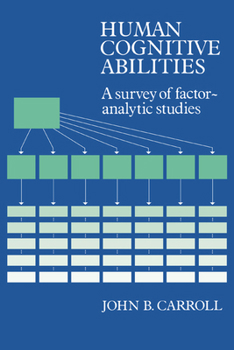Human Cognitive Abilities: A Survey of Factor-Analytic Studies
Select Format
Select Condition 
Book Overview
This long awaited work surveys and summarizes the results of more than seventy years of investigation, by factor analysis, of a variety of cognitive abilities, with particular attention to language, thinking, memory, visual and auditory perception, creativity and the production of ideas, and the speed and accuracy of mental processing. The author describes his detailed findings resulting from reanalysis of more than 460 data sets from the factor-analytic literature, followed by a presentation of a hierarchical, three-stratum theory of cognitive ability and its implications for further research. A set of three computer disks (IBM 3-1/2 1.4 megabytes, ASCII format) containing the numerical data sets and Dr. Carroll's statistical results is also available. Representing over 4 megabytes of data or roughly 2000 printed pages the disks are major resources for the interested researcher.
Format:Paperback
Language:English
ISBN:0521387124
ISBN13:9780521387125
Release Date:January 1993
Publisher:Cambridge University Press
Length:828 Pages
Weight:2.25 lbs.
Dimensions:1.5" x 6.2" x 9.3"
Customer Reviews
2 ratings
The importance of the g factor
Published by Thriftbooks.com User , 21 years ago
Claims for the importance of social class are muted today. Surveyed punters say they are all middle class; children's educational outcomes by their twenties are only slightly related to their fathers' occupations; and even the New Statesman and the Spectator have largely given up the class war. Yet might class differences merely be temporarily obscured - perhaps by mass higher education (or miseducation)? Might class differences always tend to be re-created by differences between people in intelligence? Might `the classless society' prove a chimera? Reassurance for egalitarians has long been on offer in the form of multifactorial accounts of intelligence. From 1935, American psychometrician-psychologists could be found who professed - contrary to the view obtaining in Charles Spearman's `London School' - that there were many human mental abilities of equal importance and that these cognitive variations were largely uncorrelated with each other. From Louis Thurstone's 7 `primary abilities' and J. P. Guilford's 150 `functions' to Howard Gardner's 7 `multiple intelligences' and Robert Sternberg's 676 `components' (including a few hundred `interaction effects'), the anti-elitist implication of multifactorialism was clear: given such statistical independence of abilities, no-one could be greatly superior to anyone else in all-round, general intelligence (g). The 819-page scholarly verdict of Thurstone's one-time graduate, Emeritus Professor John Carroll (University of North Carolina), must therefore attract wide interest. Can the modern egalitarians of Harvard and Yale be allowed to bask in their multidimensional proclamations? Or is the London School - with the assistance of its far-flung outposts, especially at Berkeley - vindicated by results? (Oxford and Cambridge psychologists have deemed it impolitic to participate in a debate of such glaring educational relevance.) Thankfully, few serious readers will miss the main thrust of Carroll's re-analyses of 461 well-found studies of individual differences in mental abilities. Although only a quarter of the studies involved normal population samples, and although most of them had some special focus (and so involved a less-than-catholic selection of mental tests), the positivity of inter-correlation between tests is sufficient to produce a clear g factor in 90% of them. Carroll, it turns out, has no quibble with the idea - introduced in an engaging historical chapter - that around 55% of the variance occurring on anything called a mental test will actually be common, g variance that is shared with most other mental tests. Time and again, tests named as `language comprehension', `reasoning', `auditory discrimination', `social intelligence', `spelling' and `creativity' turn out to correlated well with each other and thus with g. Carroll gladly repeats the handy dictum of the London School: `g is to psychology what carbon is to chemistry.' Regrettably, the methods involved in Carroll's factor-analytic opu
An extraordinary review of a century of factorial studies
Published by Thriftbooks.com User , 25 years ago
What would you think of an analysis of more than 400 datasets? John B. Carroll has given us an impressive review of the factorial analytic studies covered most of the human cognitive abilities. But, he has gone beyond the re-analysis level and has made up a new model of intelligence: "The three strata model" which will help us to avoid hopeless discussions about the nature of the most important cognitive abilities and to advance in the actually interested topics about such abilities. Specially, he finishes with the argument about the existence of the g factor but, he also recognizes the importance of the Thurstone's primary mental abilities and the Cattell and Horn's distinction between fluid and crystallized intelligence. I think everyone concerned in the cognitive abilities field should read this book and keep "The three strata model" in mind in the analysis of his/her research.






